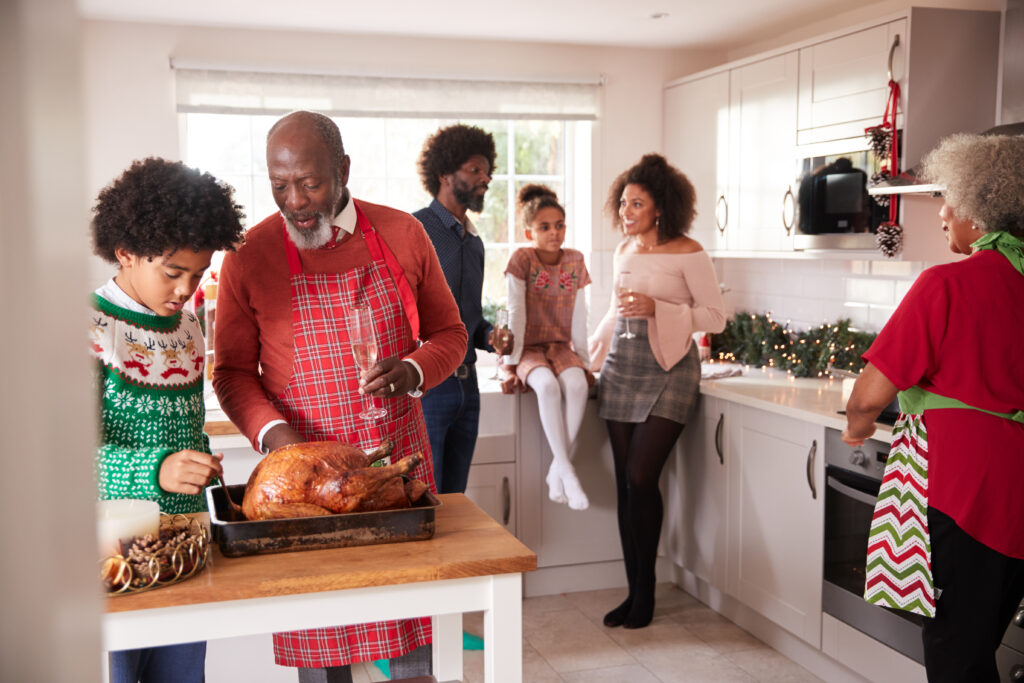Can you believe they’re letting them in?
Take off that ridiculous mask. Don’t you know it’s all a hoax?
So, who did you vote for?
I sure hope you’re vaccinated!
I can’t believe the response to the crisis overseas!
The possibilities for conflict are endless, especially as we sit down with family and friends to celebrate the holidays. Topics like politics, world events, social justice and race carry weight, not only in content but also in feelings.
While all we want to do is enjoy a holiday meal or have a civil conversation, it can feel impossible because topics like these are often emotional and can easily become heated. Sometimes it’s not even about whether people agree or disagree. Sometimes it’s just about someone looking for an opportunity to talk about their opinions (soapbox optional, but probable). This can leave you unsure what to say and how much to engage.
The most powerful solution: Take a deep breath. This is always a good answer, but especially for topics like this. There are 3 things to consider when talking about hard subjects at social events.
1. Your ideas/Their ideas:
Before you even step foot in Nana’s living room you should think about your beliefs. You don’t have to have it all figured out, but having a basic understanding of what you think and how to voice that will help you.
Maybe this means you talk about political parties, but not individual candidates. Maybe it means you stick to an issue that is important to you like vaccination or immigration. Whatever your thoughts, consider a sentence or two that sums up how you feel. This is more for you than anyone else. Similarly, you can think about the ideas of the people around you. You may already know that your uncle has a bumper sticker for that candidate you’re against and that your neighbor lost someone to gun violence. Consider what you know about the people there before you arrive. Being aware and sensitive will help lead to better conversation.
2. Engagement:
Think about how you want to engage in hot-topic conversations. Maybe you are looking forward to a heated debate with your grandad about the refugee crisis. Or maybe you don’t want to talk about it at all. Knowing how you want to engage and setting that boundary is important for your well-being.
If you don’t want to talk about a subject, consider a simple response such as:
“I don’t talk about politics, but I’d love to hear about your family.”
“Holidays are for family and friends, and I’m so glad to be here with you. What can we celebrate this year?”
3. Show love:
Ask yourself how you can show love in the situation you are in. This does not mean you ignore your boundaries or have uncomfortable conversations. It does mean you think about how to love the people you are with, even when you disagree.
Sometimes that looks like listening, other times it is about giving a hug or sharing a family memory. While you may disagree on topics, you will feel better about your holiday if your interactions are filled with love instead of anger. Consider what that looks like for you and how to show love to those around you this holiday. Sometimes that means having difficult conversations and other times it means choosing not to.
Whatever you encounter this holiday, remember to show love for others and yourself.
Rebecca Hastings is a former teacher who is passionate about authenticity, faith and family. Her books are available on Amazon, and she has been featured on sites such as The Washington Post and Parents. In real life, she can often be found typing words, driving her kids places or wherever there is chocolate. Connect with her at RebeccaHastings.net and on Instagram.

